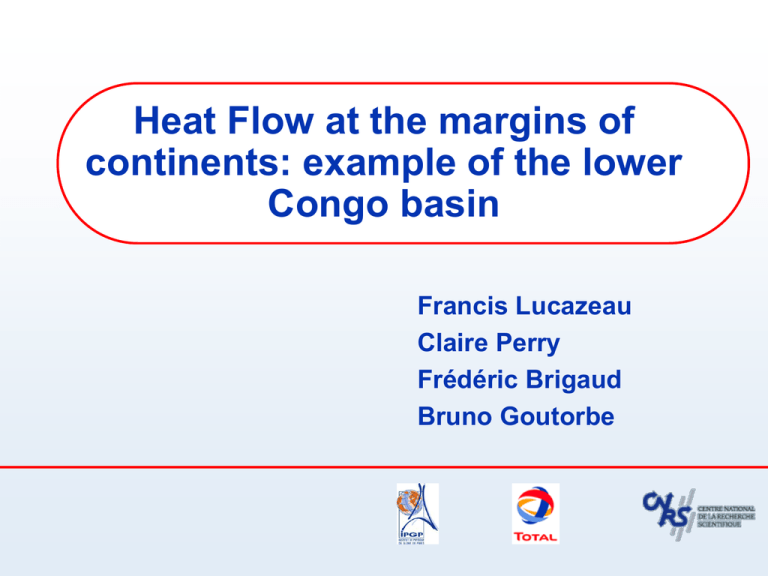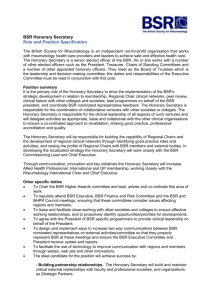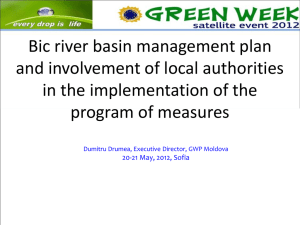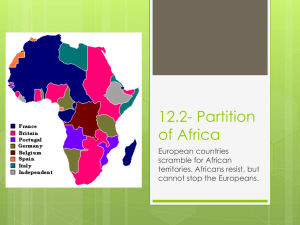slides
advertisement

Heat Flow at the margins of continents: example of the lower Congo basin Francis Lucazeau Claire Perry Frédéric Brigaud Bruno Goutorbe Question Heat flow has been used for years to constrain subsidence and oil maturation models on divergent continental margins… But do we really know how surface heat flow varies in space and time ? – – – Very few measurements Local variations Geodynamic scale Number of heat flow data 4000 3000 2000 1000 0 Ocean Basin Ocean ridge/rise Continental rise Continental shelf Tectonic setting from Pollack et al, 92 database Estimating heat flow on continental margins from White et al, 03 Conventional measurements water depths > ~1000 m Depth of BSR water depths > ~500 m not observed everywhere Oil exploration data (temperatures, well logs) availability non equilibrium temperatures Location of the lower Congo basin margin Lower Congo basin South America Africa Paranà Walvis Etendeka from Contrucci et al, 2004 2000 Bouvet 0 1000 2000 Distance (km) from White et Mckenzie, 1989 2000 Possibility for comparison of different data sets 9700 GABON 9650 CONGO 9600 9550 1076a 9500 9450 1077a 9400 RDC 9350 9300 ANGOLA 9250 9200 9150 9100 9050 9000 500 550 600 650 700 750 800 850 900 950 1000 Structural aspects in the lower Congo basin 5000 m Discontinous BSR Water bottom Pliocene base Slope deposits Stratigraphy Pliocene to Actual Miocene Tertiary turbiditic sequence Oligocene Eocene to Turonian Cenomanian Oligocene base Albian Salt Time (ms TWT) Diapir Recent heat flow measurements on extensional margins Only few academic studies… Study Location WD range (m) Heat Flow (mWm-2 ) Louden et al, 97 Galicia margin 4000 - 6000 47 ± 3 (C and O) Nagihara et al, 96 Gulf of Mexico 3000 - 3500 40 ± 47 (C and O) Polyak et al, 96 Alboran sea 600 – 2400 69 ± 6 to 124 ± 8 (C) Ruppel et al, 95 Carolina 2000 – 4000 49 ± 12 (C and O) Foucher et al, 92 Gulf of Valencia 1000 – 2000 66 ± 4 to 78 ± 13 (C) Louden et al, 91 Goban Spur ~ 4000 42 ± 4 … but many studies sponsored by oil industry! from TDI-Brooks website Measurements of heat flow in the lower Congo basin • Most of data unpublished • heat flow higher in the North, but no clear variation E-W from Sultan et al, 2004 502 m 550 m 557 m Recent Heat flow / BSR studies Study Location Agreement Characteristic Shankar et al, 04 Western India margin No comparison Lüdman et al, 04 NW Black Sea ? Martin et al, 04 Nankai prism calibration Lüdmann & Wong, 03 Sea of Okhotsk Poor Bouriak et al., 03 Vøring / Storegga calibration Henrys et al, 03 Hikurangi, New Zeal. Grevemeyer et al, 03 Central Chile calibration ODP Vanneste et al, 03 Baïkal rift Poor Lower values Nagihara et al, 02 Niger delta Mean Lower dispersion Rao et al, 01 West India margin Kaul et al, 00 Makran Golmshtok et al, 00 Baïkal Ganguly et al, 00 Cascadia margin Shyu et al, 98 SW Taiwan ? Townend, 97 New Zealand No comparison Yamano et al, 82 Nankai prism ODP conventional No comparison No comparison Poor Higher values smoother Good Estimation of temperature gradient from BSR Temperature (°C) Gas Hydrate stability 25 domain 2 20 10 % Nacl 15 0 % Nacl 10 5 Free gas -5 0 5 3 4 5 6 0 Water bottom (km) Pressure (Mpa) 30 10 15 20 1 Congo Angola Zaiango UT Congo 2 3 4 25 Temperature (°C) Gsurface (TBSR Twater _ bottom ) Z BSR Average velocity above the BSR ( from seismic lines and boreholes): 1530 +/- 30 m/s 7 Comparison of observed BSR depth and predicted depth Thermal conductivity (Wm-1K-1) 0.65 0.7 0.75 0.8 0.85 Heat flow (mWm-2) Temperature (°C) 0.9 0 10 20 30 40 50 20 0 0 100 100 100 Depth (km) 0 30 40 50 60 70 BSR 200 200 200 BSR ODP1076a ODP1077a 300 300 300 Location of BSR and estimation of temperature gradient 1076a 1077a BSR gradient versus surface measurements Variation thermal conductivity with depth Conductivity (W m-1 K-1) 1.6 From surface heat flow (= q/G) 1.2 0.8 0.4 ODP1076a ODP1077a 0 0 0.2 0.4 Depth of BSR (km) 0.6 Estimation of thermal conductivity for the hydrate domain 0.6 0.7 0.8 0.9 1 1.1 Comparison heat flow estimated from BSR and measurements Absence of heat flow anomalies related to fluids Pockmark Short length-scale anomalies related to conduction Salt dome Canyon Recent heat flow studies from oil exploration wells Study Location Temperatures Conductivity Heat Flow (mWm-2) He et al, 02 Yinggehai Basin Corrected BHT Measurements 79 ± 7 (6) He and Middleton, 02 NW Australia ? ? 53 ± 4 (7) Hu et al, 01 Bohai Basin Corrected BHT, DST Meas. outcrops 66 ± 15 (95) Forster, 01 Northeast German Basin Comparison BHT / logs Lee and Deming, 99 Oklahoma Corrected BHT Measurements 36 ± 6 (9) Gallardo and Blackwell, 99 Carter et al, 98 Anadarko basin Corrected BHT profiles Measurements Cranganu et al, 98 Oklahoma Corrected BHT profiles Measurements (cuttings) 35 to 75 Majorowicz and Embry, 98 Canadian Arctic Corrected BHT, DST Estim., harm. 53 ± 12 (156) Correia and Jones, 96 Jeanne d’Arc Corrected BHT Measur., harm. Estimated 57 (35) 29 (35) Problem of estimating thermal conductivity? Procedure for estimating heat flow from oil exploration data Correction for mud circulation 120 TERT « Heat diffusion » equilibrium temp. Temperature BHT (°C) Horner equilibrium temp. 110 PALAEO U CRET 100 Litho-stratigraphic log Geophysical well logs Mineral composition Porosity 90 80 Estimation of conductivity 70 0 40 80 120 160 200 Elapsed time (h) Homogenization with DST Relative frequency Norway Angola 0.2 0.16 0.1 0.08 0 0 -30 -20 -10 0 10 20 30 -30 -20 -10 Temperature difference (°C) 0 10 20 30 Inversion Comparison of Heat Flow from oil data with other estimates Conventional measurements BSR Global trend across the lower Congo basin margin marine measurements ocean deep offshore ~42 mWm-2 ~52 mWm-2 Oil exploration wells shelf ~70 mWm-2 BSR Oil data measurements What is the heat flow value on the Archean basement? No value on the Archean Congo craton, but 33 mWm-2 on the Tanzania craton (Nyblade, 97) + indirect evidence for low mantle heat flow -25 -15 -5 5 15 25 35 45 55 40 30 20 10 100 km 0 80 km -10 -20 60 km 40 km 30 km 20 km 100 km 10 km -30 5 km 0 km 84 estimates -6 Elastic plate thickness from gravity from Hartley et al, 96 +6 shear wave velocity variations (%) from Ritsema & van Heijst, 00 Interpretation of the trend on the lower Congo basin Two possibilities: - local high mantle heat flow - local high crustal heat production (Pan African) Evidences of higher heat flow on Mozambique margin High heat flow from Nyblade, 97 Heat Flow derived from global 3D seismic model from Shapiro & Ritzwoller, 2004 Flexural rigidity of continental margins from Watts, 1988 Gravity modelling of the Baltimore Canyon trough Best fit model: Low rigidity on the margin higher rigidity on the ocean Laboratory experiments of convection with insulating lid from Guillou and Jaupart, 1995 Heat flow discontinuity at the ocean continent boundary Convection model geometry Breaking of the Gondwana during Barremian-Neocomian -V +V = 6000 km To ~ 300 km Tc Tbase=3000 K = 8D µm=1019 Pa s µc=1022 Pa s Temperature and velocity fields at 144 Ma (lower Cretaceous) 1500 km 3000 km Temperature and velocity fields at 72 Ma (end of Cretaceous) 1500 km 3000 km Temperature and velocity fields at 0 Ma (present time) 1500 km 3000 km Comparison of T and velocity fields with and without continents 3000 km 1500 km 1500 km Surface heat flow at 0 Ma (present time) Same experience with no continent Continent 0 Continent 1 Temperature ratio at the base of continent vs heat production -V +V To Tc Internal heating ~0.5-1.2 µWm-3 for the crust Amplitude of heat flow at the continent margin Ra= 5x106 -V +V To Tc Wavelength of heat flow at the continent margin Concluding remarks about heat flow on continental margins Possibility to combine different sets of data in the lower Congo basin : – – – High mantle heat flow below old margins – – – No bias observed between the different sets Large variations at small wavelengths Emerging trend across the margin Possibly related to perturbations in the convection field Amplitude is a function of heat production in the continent Wavelength does not depend on the continent properties Need for a better knowledge of heat flow and processes on continental margin – – Importance of the slope and shelf domains Still active oil exploration in the deep offshore comparison with conventional probe measurements Statistics on heat flow in the lower Congo basin Heat flow (mWm-2) Type Gradient (mKm-1) Cond. (Wm-1K-1) mean SD min max median skewness mean SD mean SD Number Conventional 46.9 13.1 16.8 95.6 44.2 1.24 60.7 15.2 0.77 0.11 293 Short probe 46.9 13.2 16.8 95.6 44.0 1.23 60.6 15.2 0.78 0.11 282 Long probe 46.5 10.5 34.9 74.7 45.9 63.9 14.6 0.73 0.05 11 north 57.4 11.4 30.4 95.0 57.5 0.58 62.7 11.5 0.92 0.09 66 south 43.9 11.9 16.8 95.6 42.0 1.85 60.1 16.1 0.73 0.07 227 Oil 63.8 15.2 36.7 132.5 61.9 1.13 55.5 16.8 1.28 0.61 424 bathy > 200m 54.8 6.3 42.8 66.6 56.0 62.1 5.4 0.88 0.05 38 bathy < 200m 64.7 15.5 36.7 132.5 63.3 1.04 54.8 17.4 1.32 0.62 390 Oil (north) 65.8 16.7 40.4 132.5 64.6 0.94 55.0 17.9 1.35 0.66 301 Oil (south) 60.8 9.7 36.7 97.7 62.0 0.31 54.0 16.0 1.24 0.47 89 BSR1 52.2 9.5 8.7 138.1 52.7 1.51 61.8 11.0 0.84 993186 BSR1 (north) 53.7 7.5 8.7 138.1 54.5 0.91 61.6 8.3 0.87 711805 BSR1 (south) 48.4 12.5 26.5 137.9 45.5 2.44 62.2 15.8 0.78 281381








